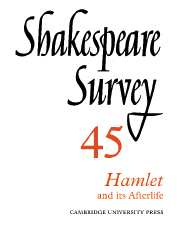Book contents
- Frontmatter
- The Reception of Hamlet
- ‘Hamlet, Revenge!’: The Uses and Abuses of Historical Criticism
- Revision by Excision: Rewriting Gertrude
- Gazing at Hamlet, or the Danish Cabaret
- ‘He’s Going to his Mother’s Closet’: Hamlet and Gertrude on Screen
- Shakespeare Rewound
- Freud’s Hamlet
- ‘Pray you, undo this button’: Implications of ‘Un-’ in King Lear
- Marx and Shakespeare
- Peter Street, 1553–1609: Builder of Playhouses
- Shakespeare Performances in England 1990–1
- Professional Shakespeare Productions in the British Isles, January–December 1990
- 1 Critical Studies
- 2 Shakespeare’s Life, Times, and Stage
- 3 Editions and Textual Studies
- Books Received
- Index
Shakespeare Performances in England 1990–1
Published online by Cambridge University Press: 28 March 2007
- Frontmatter
- The Reception of Hamlet
- ‘Hamlet, Revenge!’: The Uses and Abuses of Historical Criticism
- Revision by Excision: Rewriting Gertrude
- Gazing at Hamlet, or the Danish Cabaret
- ‘He’s Going to his Mother’s Closet’: Hamlet and Gertrude on Screen
- Shakespeare Rewound
- Freud’s Hamlet
- ‘Pray you, undo this button’: Implications of ‘Un-’ in King Lear
- Marx and Shakespeare
- Peter Street, 1553–1609: Builder of Playhouses
- Shakespeare Performances in England 1990–1
- Professional Shakespeare Productions in the British Isles, January–December 1990
- 1 Critical Studies
- 2 Shakespeare’s Life, Times, and Stage
- 3 Editions and Textual Studies
- Books Received
- Index
Summary
In 1933, reviewing a production of Twelfth Night, Virginia Woolf announced,
Shakespeareans are divided, it is well known, into three classes; those who prefer to read Shakespeare in the book; those who prefer to see him acted on the stage; and those who run perpetually from book to stage gathering plunder.
Applied to the work of critics, her image of the last group of Shakespearians in ceaseless motion suggests a group of the damned in a circle of Dante's Inferno. Those of us committed to what is now labelled stage-centred or performance oriented criticism scurry to and fro, risking finding, like most looters, that much of our booty turns out to be useless and worthless: as one of the soldiers curses, while plundering the battlefield in Coriolanus, 'A murrain on't, I took this for silver' (1.6.3).
Critics often complain about the taxonomic systems used for Shakespeare. Dissatisfied with FI'S 'comedies, histories, tragedies', bored with divisions like 'the major tragedies', 'the problem plays' or 'the romances', we try to find new and invigorating sub-divisions of the canon, new juxtapositions designed to illuminate the perceived relationships of texts. My major piece of plunder from this year's stint of reviewing is a new system for grouping Shakespeare plays. If my system is, like any other ever offered, neither cast-iron nor water-tight, as plays seem to demand awkwardly to belong to more than one group, it is at least more likely to be silver than Coriolanus' soldier's booty.
- Type
- Chapter
- Information
- Shakespeare Survey , pp. 115 - 144Publisher: Cambridge University PressPrint publication year: 1992
- 5
- Cited by



